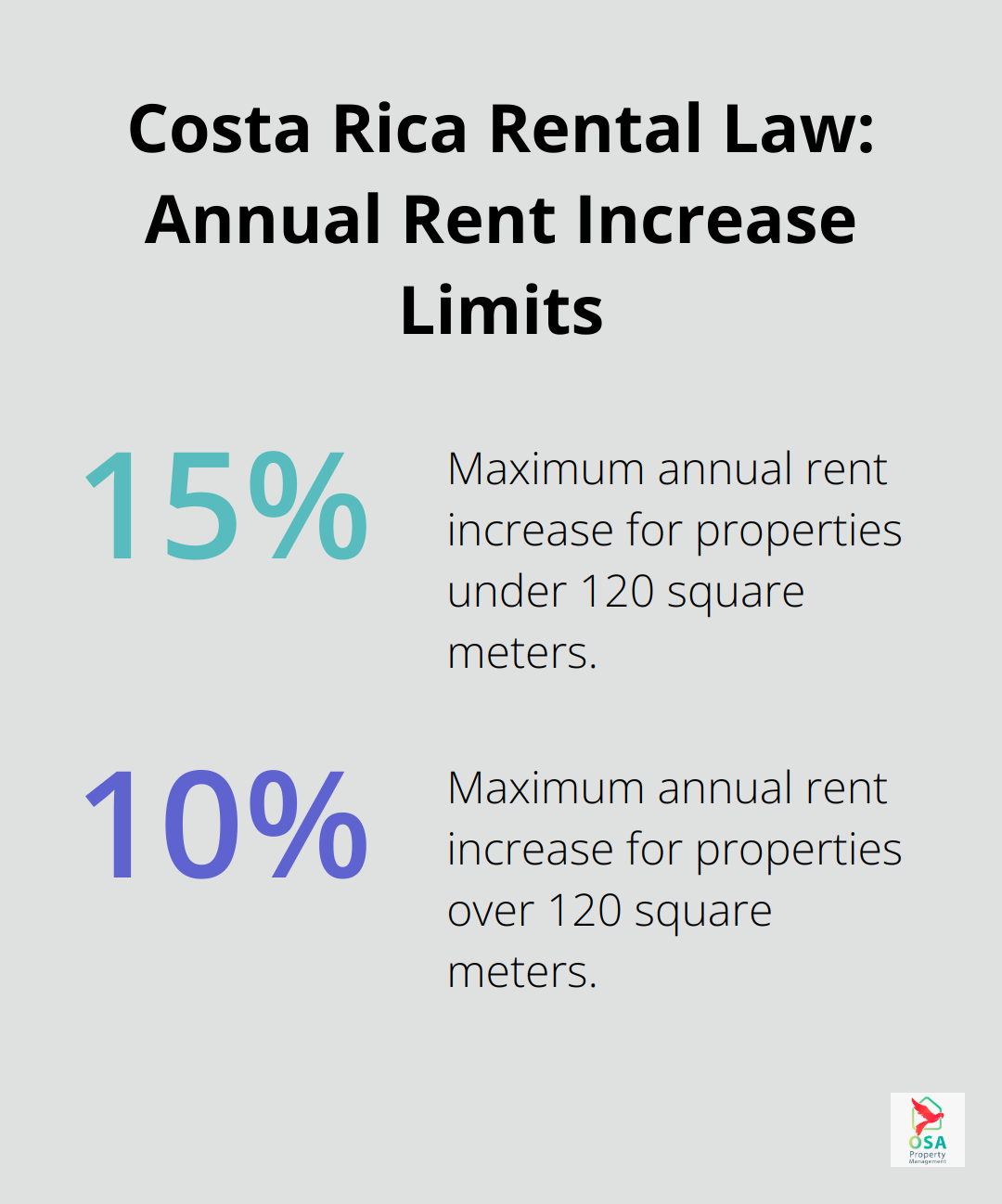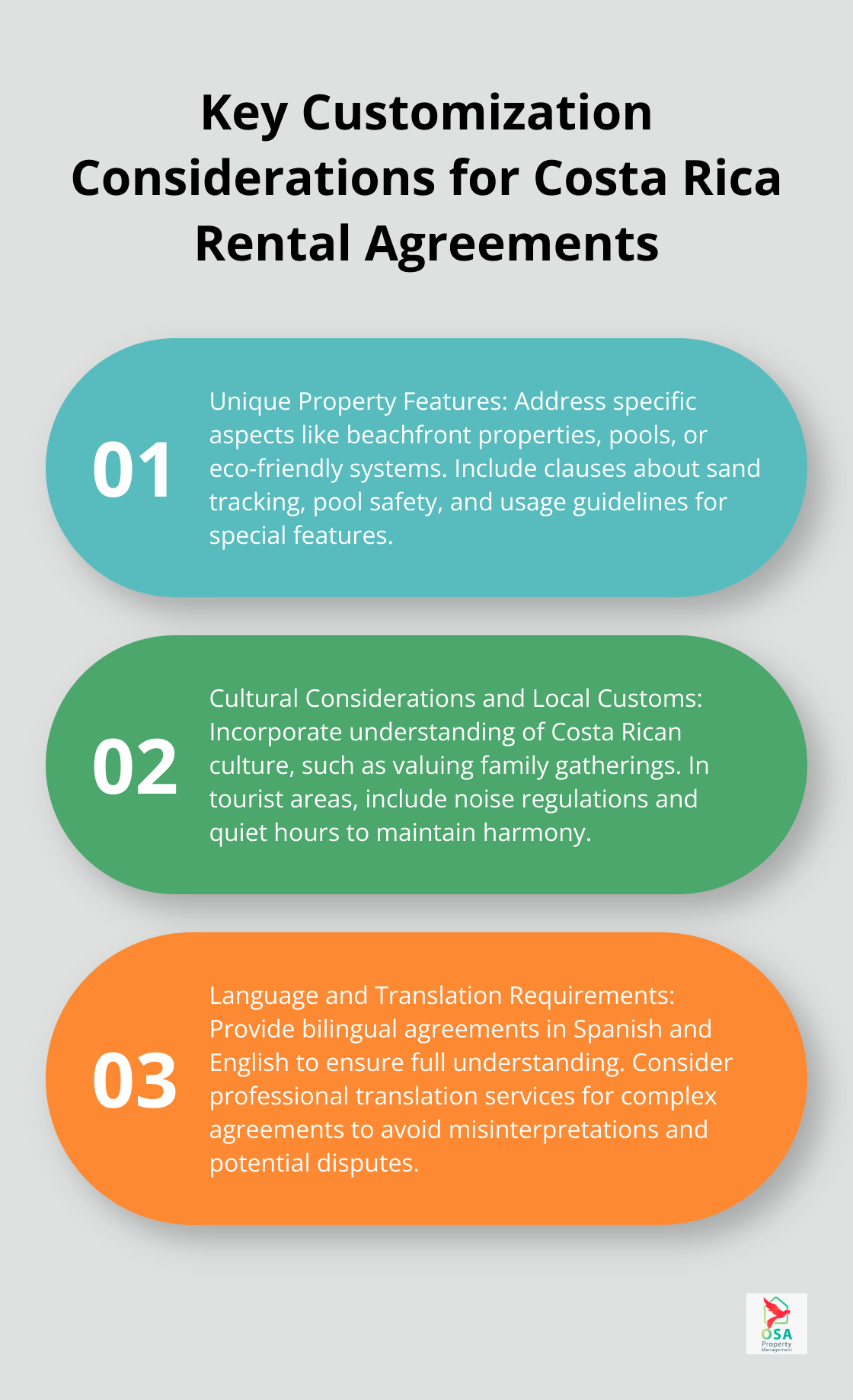Rental agreements are the backbone of successful property management in Costa Rica. At Osa Property Management, we understand the importance of crafting ironclad contracts that protect both landlords and tenants.
A well-written rental agreement can prevent misunderstandings, legal disputes, and financial losses. This guide will walk you through the essential elements, legal considerations, and customization options for creating robust rental agreements tailored to Costa Rica’s unique property landscape.
What Should a Costa Rica Rental Agreement Include?

Comprehensive Property Description
A thorough rental agreement forms the cornerstone of successful property rentals in Costa Rica. It must start with a detailed property description. Include the exact address, size, number of rooms, and unique features. For example: “3-bedroom beachfront villa in Uvita with private pool and ocean views.” This level of detail prevents misunderstandings about the rental property.
Precise Rental Terms
The agreement must specify the rental period clearly. Whether it’s a short-term vacation rental or a long-term lease, include start and end dates. Outline procedures for extensions or early terminations. An example could be: “6-month lease from June 1, 2025, to November 30, 2025, with option to extend for additional 6 months upon mutual agreement.”
Financial Specifics
State the rent amount, due date, and accepted payment methods clearly. In Costa Rica, landlords often require rent paid in advance. For instance: “Monthly rent of $1,500 USD, due on the 1st of each month, payable by bank transfer to account number XXXX.”
Include details about the security deposit (typically one month’s rent in Costa Rica). Specify conditions for its return: “Security deposit of $1,500 USD, refundable within 30 days of lease end, subject to property inspection.”
Utility and Maintenance Responsibilities
The agreement must outline who’s responsible for utilities and maintenance. In Costa Rica, tenants often pay for utilities. For example: “Tenant responsible for electricity, water, and internet bills. Landlord covers property taxes and major repairs.”
House Rules and Occupancy Limits
Set clear house rules tailored to your property. This might include policies on pets, smoking, noise levels, and guest stays. For instance: “No smoking inside the property. Pets allowed with prior approval and additional $200 deposit.”
Specify occupancy limits to prevent overcrowding and comply with local regulations. For example: “Maximum occupancy: 6 persons. Additional guests must be approved in writing.”
Local Considerations
Include clauses specific to Costa Rica. Many properties in coastal areas like Jaco or Manuel Antonio have specific rules about beach access or use of shared facilities. You might state: “Tenants have access to community pool from 7 AM to 9 PM daily.”
While these elements are essential, every rental situation is unique. Professional property management services can help tailor your agreement to your specific property and circumstances, ensuring full protection under Costa Rican law. The next section will explore the legal considerations that shape these agreements in Costa Rica.
Navigating Costa Rica’s Rental Laws
Compliance with Local and National Laws
Costa Rica’s Tenancy Law (Ley General de Arrendamientos Urbanos y Suburbanos) governs most rental agreements. This law limits rent increases to 15% annually for properties under 120 square meters and 10% for larger properties. Ignoring these limits can result in legal disputes and financial penalties.

The Ministerio de Hacienda requires all landlords to register their rental income and pay a 13% tax on rental proceeds. Non-compliance can lead to fines of up to 50% of unpaid taxes.
Tenant Rights and Landlord Obligations
Costa Rican law strongly protects tenant rights. Landlords must provide a habitable property with functioning utilities. Tenants can withhold rent for major repairs until they’re fixed. For example, a tenant legally withheld rent for two months due to a faulty septic system.
Landlords have the right to inspect the property but must provide 24 hours notice. Unannounced visits can become grounds for legal action by the tenant.
Termination and Eviction Procedures
Eviction in Costa Rica often takes 3-6 months, even with valid reasons (such as non-payment of rent after two months, property damage, or illegal activities on the premises).
Fixed-term leases require a minimum of three months’ notice for early termination by either party. Clear procedures in rental agreements can facilitate amicable early terminations.
Insurance and Liability
While not legally mandated, property insurance is highly recommended for landlords. Costa Rica’s rainy season can cause flooding and other weather-related damages. In 2017, insurers paid CRC 360.2 billion in claims.
Liability clauses in rental agreements should clearly state the tenant’s responsibility for damages beyond normal wear and tear. Comprehensive liability clauses have saved landlords thousands of dollars in repair costs.
Understanding these legal nuances protects your investment. However, each rental situation presents unique challenges. The next section will explore how to customize your rental agreement to address specific property features and cultural considerations in Costa Rica.
How to Tailor Your Rental Agreement for Costa Rica

Costa Rica’s unique property landscape demands customized rental agreements. Tailored contracts can prevent disputes and protect investments. Here’s how to customize your rental agreement for Costa Rica properties:
Addressing Unique Property Features
Costa Rica’s diverse properties often come with special features. For beachfront properties, include clauses about sand tracking and saltwater damage. One agreement specified: “Tenants must rinse off sand before entering the house. Failure to do so may result in additional cleaning fees.”
For properties with pools, outline safety rules and maintenance responsibilities. A recent agreement stated: “Tenants must not leave children unattended near the pool. Pool cleaning is conducted weekly by the landlord’s appointed service.”
If your property has eco-friendly features (like solar panels or rainwater collection systems), include usage guidelines. One environmentally conscious landlord included: “Tenants agree to use the solar-powered appliances as instructed to maximize energy efficiency.”
Cultural Considerations and Local Customs
Understanding Costa Rican culture can help create more effective agreements. For instance, Costa Ricans often value community and family gatherings. One long-term rental agreement included: “Tenants may host family gatherings of up to 15 people twice a month without prior approval.”
In tourist areas like Manuel Antonio or Jaco, noise regulations are important. A recent short-term rental agreement specified: “Quiet hours from 10 PM to 7 AM. Excessive noise may result in loss of security deposit.”
Language and Translation Requirements
Costa Rica’s official language is Spanish, but many property owners and renters speak English. We recommend bilingual agreements to ensure all parties fully understand the terms. A clause often included states: “This agreement is provided in both English and Spanish. In case of discrepancies, the Spanish version shall prevail.”
For complex agreements, professional translation services are worth the investment. One property owner saved thousands in potential legal fees by having their agreement professionally translated, catching a mistranslation that could have led to a dispute over maintenance responsibilities.
Short-term vs. Long-term Considerations
Short-term vacation rentals require different terms than long-term leases. For vacation rentals, include clauses about check-in/check-out times, cleaning fees, and tourist taxes. A recent agreement for a Uvita beach house stated: “Check-in time is 3 PM, check-out is 11 AM. A cleaning fee of $100 will be charged for stays under 5 nights.”
Long-term rentals should address issues like rent increases, property improvements, and lease renewal options. One year-long lease in Ojochal included: “Rent may increase by up to 10% annually, with 60 days’ written notice before lease renewal.”
Tailoring your rental agreement to Costa Rica’s unique property landscape sets the stage for positive landlord-tenant relationships. Each property and rental situation is unique. Professional property management services can offer valuable expertise in crafting agreements that stand up to legal scrutiny while addressing the specific needs of your Costa Rica property.
Final Thoughts
Rental agreements form the cornerstone of successful property management in Costa Rica. These documents protect investments, prevent misunderstandings, and foster positive landlord-tenant relationships. Well-crafted agreements provide clarity for all parties involved, potentially leading to longer-term rentals or repeat visitors.
Costa Rica’s property laws, local customs, and unique property features present challenges, especially for foreign investors. Professional property management services offer invaluable assistance in navigating these complexities. Their expertise helps create comprehensive, legally sound rental agreements tailored to specific properties and rental situations.
Osa Property Management understands the intricacies of Costa Rica’s rental landscape. We offer expert guidance in crafting robust rental agreements and handle all aspects of property management. Our comprehensive approach maximizes investment potential while minimizing risks (from securing quality renters to overseeing maintenance and day-to-day operations).

